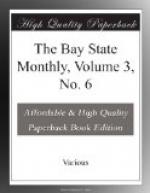1.—In one of the old Readers, I find a selection, not credited to any author, and beginning as follows:—“Born, sir, in a land of liberty; having early learned its value; having engaged in a perilous conflict to defend it; having, in a word, devoted the best years of my life to secure its permanent establishment in my country, my anxious recollections, my sympathetic feelings, and my best wishes are irresistibly excited, whensoever in any country, I see an oppressed nation unfurl the banners of freedom.” Will some one of your readers inform me who was the author of these words, and what was the occasion for their utterance?—W.T.D.
2.—Sullivan, in his Familiar Letters, states (p. 26) that: “General Washington is well known to have expressed his heartfelt satisfaction that the important State of Massachusetts had acceded to the Union. There is much secret history as to the efforts made to procure the rejection (of the constitution) on the one side, and the adoption on the other.” Where can I find the fullest account of this “secret history?”—STUDENT.
3.—Who was the first American woman to publicly espouse the cause of Anti-Slavery? I have lately seen several names mentioned?—M.S.
4.—“Where can I find the best account of the Know-Nothings, that figured in American politics some years ago?”
5.—The late Epes Sargent, in one of his sketches, says:—
“Semmes took a pinch of snuff, and replied,—’You remember Mrs. Glasse’s well-known receipt for cooking a hare—First catch your hare!’”—Who was Mrs Glasse?—LATIN SCHOOL.
6.—Where can I find a full account of the history of the Indian tribes of early Massachusetts? The various State Histories say but little about them.—ANTIQUARY.
7.—Has the life of Robert Rantoul Jr. ever been written? If so, by whom?—H.A.D.
8.—Most of our States have one capital; some have two—Providence and Newport, in Rhode Island for instance. Why two?
9.—In Chandler Robbins’ “History of the Second Church,” under date of Oct. 7. 1762, occurs the following: “Voted that the singers sound the base at the end of the lines whenever they think proper.” What is the explanation of this custom?
10.—Bartlett does not give this: “To fleet the time carelessly, as they did in the golden world.” Where is it to be found?—ELHEGOS.
* * * * *
=========================================================
==============
“Undoubtedly the most remarkable series of articles ever published in a magazine, and their popularity is in, accord with their merit.”—BROOKLYN EAGLE.
Of the numbers of THE CENTURY from November, 1884 to April 1885, six issues, more than a million and a quarter copies have already been published.




